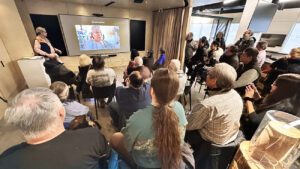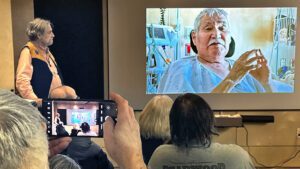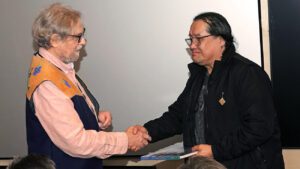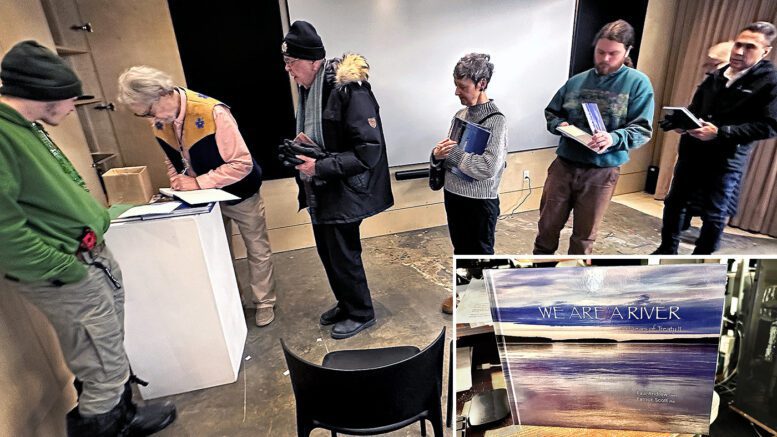“Something the Dene have celebrated is that they’ve kept their word. No matter what the non-Indigenous people did with the treaties. The Dene kept their word.”
~ Co-author of We Are a River, Paul Andrew, a former chief of Tulita.
We Are a River is a pictorial commemoration and commentary of the 100th anniversary events of Treaty 11.

We Are a River co-author Patrick Scott plays a video from his book project partner, Paul Andrew, at the launch event Wednesday night at the Yellowknife Visitors Centre. (Photo by James O’Connor/CKLB.)
At the public launch Wednesday night at the Yellowknife Visitors Centre, over 60 people listened to the Dene Drummers, a presentation and readings by co-author Patrick Scott.
That was followed by Dene National Chief Gerald Antoine in an audio message from Ottawa, and Native Communications Society of the NWT (NCS) board member JC Catholique.
Scott’s presentation started with a video of co-author Paul Andrew, who couldn’t be at the launch s he is in hospital.
“The title We Are a River is because no matter what happens, our people keep moving forward,” he said. “I think it’s really important that everybody in general, has an obligation to ensure that the contents of Treaty 11 are respected.
“And that means people like you and me have to know what is in the Treaty, so that it becomes a living document that we live by on a regular and daily basis.”

We Are a River co-author Paul Andrew spoke about the book and Dene history surrounding Treaty 11 from his hospital bed. His co-author Patrick Scott looks on at the launch event Wednesday night at the Yellowknife Visitors Centre. (Photo by James O’Connor/CKLB.)
As Andrew finished, Scott told the audience: “I’m humbled to have been able to work with him.”
Summer 2021 marked the centennial of the signing of Treaty 11 by the Crown and representatives of the Dehcho, Tłı̨chǫ, Sahtu and Gwich’in peoples.
Treaty 11 covers 950,000 square-kilometres of present-day Yukon, Northwest Territories and Nunavut.
As a result of the worldwide pandemic, Dene communities across the NWT commemorated the Treaty 11 centennial in 2021, with some opting for 2022. A handful chose to do nothing at all.
Native Communications Society operates CKLB 101.9 FM, which delivers Aboriginal language services to 33 different communities, three diamond mines, as well as into Alberta and Nunavut.
To document Treaty 11 events, CKLB staff went out to document the events, large and small.
“It’s nice to see so many people in the pictures,” said Moise Rabesca, a Tłı̨chǫ Elder.
Reflecting on her advance copy, she noted the activities pictured are, “what our Elders taught us.”
Co-authors Andrew and Scott painstakingly selected images from a collection of about 7,000 pictures for the high-quality hard-cover book.
The story behind Treaty 11 produced over time two divergent understandings about what it meant.

Patrick Scott shares a laugh with Gwich’in singer/songwriter and flute player William Greenland, during the book draw at the launch of We Are a River. (Photo by James O’Connor/CKLB.)
Scott explains how Treaty completely changed the Dene way of life.
“It introduced people to colonial activities and that change how they lived on a day to day basis. That continues to this day, he said.
“For young people in particular, (it’s important) to have the story of what the Treaty meant to their forefathers who signed it. And then to be able to experience that dynamic interaction of who they are today as Dene and what their ancestors were 100 years ago.
“It kind of bridges that it helps them connect to their past and, and gives them something to, to use as they go forward as well.”
Andrew said the Treaty is considered a sacred document.
“For the generation that signed the agreement, this is a sacred document, as it refers to the sun, the water and the land. And because it’s a sacred agreement, an agreement between two nations, it has to be respected and treated as such.”
We Are a River will be distributed to band offices, school, public libraries and local outlets in the next couple of weeks.
The non-profit NCS acknowledges support for the project from Heritage Canada, the Dene Nation, CKLB and the “kindness and generosity” of the Dene people in Denendeh communities visited for the book.
Treaty 11 provided the government with land for development and in exchange, signatory First Nations received: lands for a reserve, annuities, and the continued right to hunt and fish on unoccupied Crown lands.
But the federal government had its eye on the natural resources of the region, including oil at Norman Wells. The Treaty signatories were also brought under the federal government’s rule of law.

Eleven copies of We Are A River were given away to those in attendance in a draw Wednesday night at the Yellowknife Visitors Centre. (Photo by James O’Connor/CKLB.)
~ With files from Mariah Caruso/CKLB





